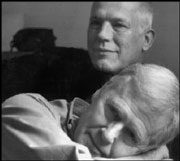WORKING IN a nonrepresentational art form like music, it’s natural that composers should occasionally get hungry for more concrete modes of expression. It’s not surpising, then, that so many of them turn to prose. Rare is the major composer who doesn’t leave behind a theoretical treatise, a cache of entertaining letters, or copious examples of reviews and essays. Conversely, there are even a few writers who have dabbled in music (Paul Bowles, Ezra Pound).
But no one balances the two arts like Ned Rorem, as renowned for his diaries and criticism as for his music. Now 78, Rorem has published five volumes of diaries covering nearly 50 years (in addition to his 1994 memoir, Knowing When to Stop, which begins with his childhood and leaves off where his diaries start). The first volume, The Paris Diary, came out (pun intended) in 1966 and recounted his four years of high life and musical productivity in Paris from 1951 to 1955. Notably talented, strikingly pretty, and unapologetically indulgent of his appetites, Rorem was the extended houseguest of Marie Laure, Vicomtesse de Noailles during these years. All of these circumstances earned him entry to Paris’ upper social and artistic circles. The book was a sensation, particularly because Rorem never hid—nor made a big deal about—his gayness.
The Paris Diary‘s main topics, to which Rorem remained faithful throughout the five volumes, are music, name-dropping, and sex/love. This last topic is where Rorem broke literary ground: On the very first page, for example, he writes, “Lunch yesterday with Nora Auric and Guy de Lesseps. We talked of nothing but masturbation.” There are allusions to cruising; a long and frank letter to a lover; and, in the next volume, The New York Diary, this purple description of a bathhouse: “Some . . . squat in foggy corners, immobile as carnivorous orchids, waiting to ‘go up’ on whatever passes. There’s one! on his knees, praying with tongue more active than a windmill in a hurricane, neck thrown back like Mata Hari’s and smeared with tears. . . .”
The chronicle continues with The Final Diary—renamed The Later Diaries—covering 1961-1972; The Nantucket Diary (1972-1985); and, just published last winter, Lies (Counterpoint, $30), which recounts 1986-1999. All of them are full of pointed opinion on the changing mores of both gay life and contemporary music. Lies is the richest of them all, elegiac in tone and shot through with multiple tragedies: the deaths of his parents, longtime friends like Leonard Bernstein, Aaron Copland, and Virgil Thomson, and his partner of 32 years, organist James Holmes, who died in 1999, at age 59, of stomach cancer.
ROREM’S ADMISSION of his own character flaws makes for more amusing, if sometimes irritating, reading. His musical martyrdom, another favorite topic, is a leitmotif running through all five volumes—despite his 1976 Pulitzer Prize, his election to the American Academy of Arts and Letters, his steady stream of commissions and concerts, his lucrative teaching posts, and the many times he’s been referred to as America’s greatest composer of art songs (with almost 400 to his credit). In 1994, for example, he recounts six major performances in New York City alone—but complains that none of them were reviewed.
But his complaints of neglect were justified. Rorem held high the banner of traditional tonality through his career, defending simplicity, tunefulness, and a Francophile’s sense of elegance during the decades of atonal fashion. He’s also maintained a disciplined sense of craftsmanship, resulting in a considerable output; in addition to the songs, there are essays in the traditional forms of symphonies, concertos, and chamber music. The lukewarm reception of his 1965 opera Miss Julie dissuaded him from any subsequent major stage work, but he’s come up with a hybrid genre, somewhere between chamber opera and semistaged song-cycle. Unlike Bernstein, whose music was as flamboyant as his personality, Rorem’s conservatism stands in contrast to his candid prose. His music is emotionally open but rarely flashy, and judiciously uses of some of the century’s innovations in instrumental sound and technique. “Use no trick beyond the biggest trick” is one of his songwriting credos; since singing a poem is already artifice, Rorem refrains from ’60s-style vocal effects. He feels more at home with euphony and clarity than with dissonance and busy counterpoint, although there are some surprisingly knotty moments in some of his chamber music. Rorem’s music has its champions, but its mildness belies his strength as a courageous gay pathbreaker and a writer of incomparable panache.







